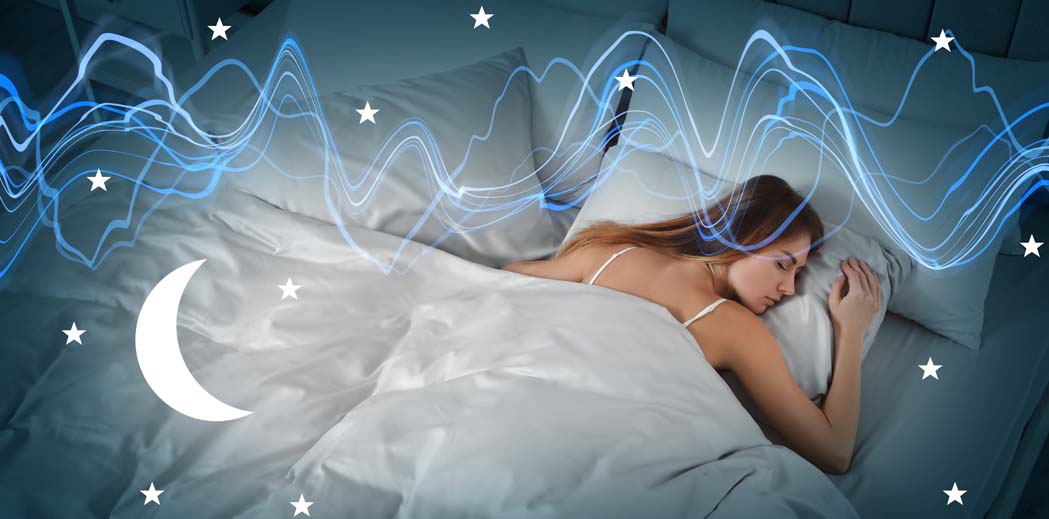
Discovering the Vital Role of a Good Night’s Sleep in Your Life
Every night, your body requires a few hours of deep sleep to stay physically, mentally, and emotionally healthy. Unfortunately, hustling and bustling lifestyles make it harder for most people to prioritize those essential hours of rest. Late nights, persistent distractions, a strained sleep environment, and many other factors continually disrupt our sleep, leaving us too tired, anxious, and less productive.
The fact is, getting a good night’s sleep isn’t just a mere luxury. It’s one of the most crucial things you can do for your overall well-being. In this blog, we will explore the myriad benefits of getting sufficient sleep. By understanding the importance of a good night’s sleep, we can adopt healthy habits and prioritize this essential aspect of our lives.
Understanding the Role of Circadian Rhythm1
Our bodies have an internal clock known as the circadian rhythm, which regulates various biological processes, including sleep and wakefulness. Understanding the role of circadian rhythm is key to optimizing our sleep patterns:
- Natural sleep-wake cycle: The circadian rhythm helps synchronize our sleep-wake cycle with the 24-hour day-night cycle. It operates on a roughly 24-hour schedule and is influenced by external cues such as daylight and darkness.1
- Melatonin production: The circadian rhythm governs the production and release of melatonin, a hormone that plays a vital role in regulating sleep. Melatonin levels rise in the evening, signaling to our bodies that it’s time to wind down and prepare for sleep.1
- Morning light exposure: Exposing yourself to natural light in the morning helps regulate your circadian rhythm. Natural light, particularly sunlight, inhibits the production of melatonin, making you more alert and energized for the day ahead.1
- Evening wind-down routine: As evening approaches, it’s essential to create a wind-down routine that promotes relaxation. Dim the lights, avoid stimulating activities, and limit exposure to blue light from electronic devices. This signals to your body that it’s time to prepare for sleep.1
- Consistency and regularity: Maintaining a consistent sleep schedule, even on weekends, helps regulate your circadian rhythm. Going to bed and waking up at the same time every day reinforces your body’s internal clock and promotes better sleep quality.1
- Jet lag and shift work: Traveling across time zones or working night shifts disrupts the circadian rhythm, leading to sleep difficulties and fatigue. To mitigate the effects, gradually adjust your sleep schedule before traveling or maintain a consistent sleep-wake routine for shift work.1
- Seasonal changes: The changing seasons and daylight saving time can affect your circadian rhythm. Adjust your sleep routine accordingly to accommodate the shifting daylight hours.1
By aligning our sleep patterns with the natural rhythm of our body’s internal clock, we can optimize our sleep quality and overall well-being. So, embrace the symphony of your circadian rhythm, and let it guide you to a world of deep, rejuvenating sleep. Sleep well and thrive!
Physical Health Benefits:
A good night’s sleep is a cornerstone of physical health. During sleep, our bodies engage in vital restorative processes that promote optimal functioning. Here are some key benefits of quality sleep on our physical well-being:
- Whole-body support: Sleep plays a crucial role in strengthening our immune system and helps support our cardiovascular and digestive system health.2
- Energy and Metabolism: Proper sleep helps you to metabolize food properly, burn calories during REM sleep, and have more energy during the day.3
- Hormonal balance: Adequate sleep supports the proper functioning of our endocrine system, which regulates hormone production and balance. Hormones control various bodily functions, including metabolism, appetite, and mood.4
- Recovery: Sleep provides time for the body to restore and recharge, playing a key role in nearly all aspects of physical health.5
- Weight management: The hormones that regulate hunger and appetite are significantly affected by sleep. Inadequate sleep affects the regulation of ghrelin and leptin hormones, which leads to increased appetite, overeating, and weight gain.2
Mental Health Benefits:
A good night’s sleep is not only vital for our physical health but also plays a significant role in cognitive function and mental well-being. Here are a few ways that quality sleep may positively impact our mental faculties:
- Memory consolidation: While we sleep, our brains consolidate and organize memories, enhancing learning and retention. Sufficient sleep improves cognitive abilities, concentration, and problem-solving skills.2
- Mood regulation: Lack of sleep leads to irritability, mood changes, emotional instability, and stress. Conversely, healthy sleep patterns enhance positive emotions, reduce pessimism and anxiety, and help with anger management.2
- Mental clarity and creativity: A well-rested mind is sharper, more alert, and better able to think creatively. Quality sleep improves our ability to focus, make decisions, and generate innovative ideas.5
- Stress reduction: Sleep acts as a natural stress reliever. A good night’s sleep helps regulate stress hormones, reducing anxiety levels and promoting emotional resilience.5
Revitalizing your productivity:
Adequate sleep is closely intertwined with productivity and overall performance in various areas of life. A good night’s sleep results in increased productivity, improved performance, and lower absenteeism from work.6 You’ll be more alert, focused, and energized to tackle new projects and tasks. Consider the following benefits of quality sleep on our ability to excel:
- Enhanced cognitive performance: Quality sleep improves memory, attention, problem-solving skills, and creativity, leading to better cognitive performance and productivity.7
- Increased energy and alertness: Sufficient sleep provides the energy and mental clarity required to face daily challenges, whether at work, school, or personal endeavors.6
- Better decision-making: When well-rested, we are better equipped to make sound judgments and logical decisions, avoiding impulsive or rash choices.8
- Improved physical performance: Athletes and active individuals understand the importance of sleep in optimizing performance. Good sleep enhances coordination, reaction time, and overall physical abilities.9
- Reduced errors and accidents: Sleep deprivation significantly increases the risk of accidents, both on the road and in the workplace. By prioritizing sleep, we can mitigate the chances of errors and mishaps.10
Creating an Optimal Sleep Environment:
The quality of our sleep is greatly influenced by the environment in which we rest. By making a few adjustments to our sleep environment, we can create a more conducive atmosphere for restful nights.
By implementing these tips and personalizing your sleep environment, you can maximize the chances of experiencing a peaceful and rejuvenating night’s sleep:
- Dim the lights11: Bright lights can disrupt our natural sleep-wake cycle. Use dimmers or opt for soft, warm lighting in the evening to signal to your body that it’s time to wind down. Consider using blackout curtains or an eye mask to block out any unwanted external light.
- Comfortable bedding11: Invest in a comfortable mattress, pillows, and bedding that suit your preferences. The right combination of support and softness can make a significant difference in the quality of your sleep.
- Noise reduction11: Excessive noise can disrupt sleep and prevent us from entering deeper, more restorative sleep stages. Use earplugs, white noise machines, or soothing sounds like nature sounds or soft music to mask disruptive noises.
- Temperature control11: Keep your bedroom at a cool, comfortable temperature. The optimal range is generally between 60 to 67 degrees Fahrenheit (15 to 19 degrees Celsius). Adjust your bedding and pajamas accordingly to ensure you neither feel too hot nor too cold during the night.
- Declutter your space11: A cluttered and messy bedroom can subconsciously contribute to a restless mind. Keep your sleep environment tidy and organized, creating a sense of calm and tranquility.
- Establish a bedtime routine11: Create a relaxing routine before bed to signal to your body that it’s time to unwind. This could include activities like reading a book, taking a warm bath, practicing meditation or deep breathing exercises, or listening to soothing music.
- Limit electronic devices11: The blue light emitted by electronic devices such as smartphones, tablets, and laptops can disrupt our sleep patterns.12 Avoid using these devices for at least an hour before bed or consider using blue light filters or wearing blue light-blocking glasses.
- Minimize disruptions11: If possible, create a sleep-friendly environment by minimizing disturbances such as pets in the bed, noisy clocks, or electronic devices that emit notifications. Make your bedroom a dedicated space for rest and relaxation.
Embracing the Transformative Power of Restful Nights:
In a society that often values productivity over self-care, the importance of a good night’s sleep cannot be stressed enough. Many people still view sleep as a passive activity, but it’s crucial to understand that it’s an active state responsible for revitalizing and restoring your body, mind, and soul. By understanding the vital role sleep plays in our lives, we can make informed choices to prioritize our rest and create healthy sleep habits.
Remember, quality sleep is not a luxury but a necessity for optimal health and well-being. By prioritizing sleep, we can unlock our full potential, lead healthier lives, and thrive in every aspect of our daily endeavors.
SOURCES:
1 Circadian Rhythms, National Institutes of Health
2 The Benefits of Getting a Full Night’s Sleep, SCLHealth.org
3 Sleep and Metabolism: An Overview, National Institutes of Health
4 Missing Sleep? Why Your Hormones May Be Responsible, Healthline.com
5 Eight Health Benefits of Sleep, Sleepfoundation.org
6 The Link Between Sleep and Job Performance, Sleepfoundation.org
7 How Does Lack of Sleep Affect Cognitive Impairment?, Sleepfoundation.org
8 How Sleep Affects Decision Making, Eachnight.com
9 Can Sleep Deprivation Affect Reaction Time?, Sleepfoundation.org
10 The Relationship Between Sleep and Workplace Accidents, Sleepfoundation.org
11 Sleep Hygiene Checklist: Fall Asleep Faster, Stay Asleep Longer, Skillshare.com
12 Blue light has a dark side, Harvard Medical School






















